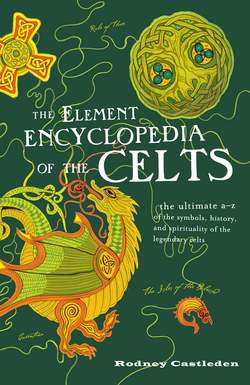Читать книгу The Element Encyclopedia of the Celts - Rodney Castleden - Страница 80
CARATACUS
ОглавлениеA king of the Catuvellauni tribe, who led the British resistance to the Roman invasion in the first century AD.
Caratacus (Caradog in Welsh) was a son of King Cunobelin of the Catuvellauni and a warrior chief already experienced in warfare before the Roman conquest began. He was actively involved in the expansion of his tribe’s territory, fighting battles to achieve this. He was the protégé of his uncle Epaticcus, who was responsible for extending the power of the Catuvellauni westward into the territory of the Atrebates. Epaticcus died in about AD 35, and after that the Atrebates, under their leader, King Verica, were successful in regaining some of their lost territory. But Caratacus regained the upper hand, completed the Catuvellaunian conquest of the Atrebates, and Verica was deposed.
Success for Caratacus meant defeat for his enemies, and defeated kings went to Rome with their grievances. Verica went and appealed to Claudius to have his kingdom restored to him. This gave Claudius the pretext he was looking for to invade and conquer Britain in AD 43. By now, the powerful Cunobelin was dead and the defense of his Southern Kingdom was in the hands of two of his sons, Caratacus and Togodumnus. The smaller kingdoms in Britain were relatively powerless and disorganized, so it was left to Caratacus and Togodumnus to provide the leadership.
Rome meanwhile pitted four legions against Britain, under Aulus Plautius: around 40,000 men. In his resistance to Rome, Caratacus used a combination of guerrilla warfare and set-piece formal battles. He was more successful in guerrilla fighting and kept to this whenever he could.
The Catuvellauni were defeated in two crucial battles, on the Medway and Thames, and this led to the loss of most of the south-east to the Romans. According to one reading of the Roman accounts, Togodumnus was killed and the Catuvellauni territory was overrun by Rome. Another reading suggests that Togodumnus may have been on the side of Rome against his brother, survived the two battles and later continued to collaborate with the Romans.
Claudius arrived in Britain in time to witness his legions marching in triumph into the town of Camulodunum.
Caratacus survived this final defeat, retreating to the west, where he continued the resistance against the spread of Roman control in Wales, leading the Silures and Ordovices tribes. He was now fighting Plautius’ successor as governor, Publius Ostorius Scapula. Scapula defeated Caratacus in the Battle of Caer Caradoc, captured Caratacus’ wife and daughter, and received the surrender of his brothers. Caratacus himself somehow escaped capture and fled northward into the territory of the Brigantes. There Queen Cartimandua captured him and handed him over to the Romans.
Once Caratacus had been captured, the Romans were in control of most of what is now England and Wales. He was sent to Rome as a prize of war, and would, according to normal Roman practice, have been executed after a triumphal procession. In spite of being a captive, he was allowed to make a speech to the senate:
If the degree of my nobility and fortune had been matched by moderation in success, I would have come to this City as a friend rather than a captive, nor would you have disdained to receive with a treaty of peace one sprung from brilliant ancestors and commanding a great many nations. But my present lot, disfiguring as it is for me, is magnificent for you. I had horses, men, arms, and wealth: what wonder if I was unwilling to lose them? If you wish to command everyone, does it really follow that everyone should accept your slavery? If I were now being handed over as one who had surrendered immediately, neither my fortune nor your glory would have achieved brilliance. It is also true that in my case any reprisal will be followed by oblivion. On the other hand, if you preserve me safe and sound, I shall be an eternal example of your clemency.
This speech was so impressive and effective that Claudius pardoned Caratacus. He was granted a pension and he and his family were permitted to live in Rome. Caratacus in his turn was so overwhelmed by the majesty of the city that he was bewildered that the Romans could be interested in conquering Britain. He said, “And can you, then, who have such possessions and so many of them, covet our poor tents?”
